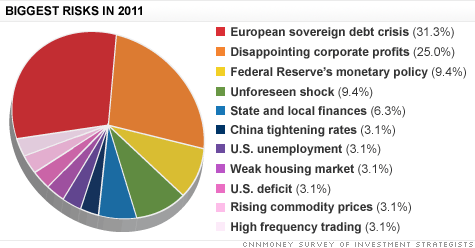 Investors are optimistic that stocks will continue to recover in 2011, but it will be far from a smooth ride, thanks to a number of potential road blocks along the way.
Investors are optimistic that stocks will continue to recover in 2011, but it will be far from a smooth ride, thanks to a number of potential road blocks along the way.The biggest hurdle this year will be Europe's ongoing sovereign debt crisis, according to an exclusive CNNMoney survey. While all 32 of the experts surveyed forecast gains for the S&P 500, nearly a third of them agreed that fiscal woes in Europe could undercut the upward momentum.
Investors first became fixated on euro zone money troubles in early 2010, after worries about Greece defaulting on its debt spread to the other so-called PIIGS, including Portugal, Ireland, Italy, and Spain.
To keep Europe from unraveling, the troubled countries have been rescued with bailout packages and austerity measures.
But investors aren't convinced that those bandages will stick through the end of the year. They fear that the problems could escalate before they improve, and rattle the global financial system much like the collapse of Lehman Brothers, which sent markets into a tailspin more than two years ago.
"Europe is still an issue because we don't know the final outcome," said Brian Gendreau, market strategist at Financial Network Investment Corp., a Segunda, Calif.-based advisory firm. "As long as uncertainty persists about the European debt problems, investors will be jittery and the markets will be volatile." www.wdalaw.com
Even if the austerity measures work to keep Europe intact, there could be fallout from the belt-tightening, said Tyler Vernon, chief investment officer at Biltmore Capital.
CNNMoney survey: Where the markets are headed
"More than 25% of U.S. exports go to Europe, and I think people are underestimating what's going to happen to U.S. GDP as the austerity measures force euro zone nations to clamp down on spending," Vernon said.
He said a hit on exports could shrink U.S. economic growth by 50 to 75 basis points, which could keep the already sluggish pace under a 3% annual growth rate for a while longer. Currently, U.S. GDP sits at 2.6%.
Corporate America may also feel a pinch on their balance sheets since more than 50% of the companies in the S&P 500 generate a decent chunk of their earnings by doing business across the Atlantic, Vernon said.
Even if Europe holds its own, corporate profits could still underwhelm investors.
0:00 /5:12Curbing risk in 2011
For the past couple of years, companies have focused on cutting costs to boost their earnings as revenues remained subdued. And that has left many firms about as lean as they can get.
A quarter of those surveyed by CNNMoney said poor company earnings are the biggest risk to the market's gains.
"Disappointing profits are the biggest threat as corporations face margin squeezes," said Lee Patridge, chief investment officer at Salient Partners.
Experts say companies now have to improve the top line of their balance sheets to satisfy investors.
That's particularly crucial as the "current, favorable credit conditions turn cold," Patridge added.
The Federal Reserve has been working hard to keep those conditions favorable, but it remains to be seen how successful those actions will be.
Despite the Fed's move to buy $600 billion worth of long-term Treasuries to drive interest rates lower and jumpstart the economy, yields have actually climbed and experts say they will continue that trend.
Market experts and 25 leading economists surveyed by CNNMoney forecast the benchmark 10-year yield will hit 3.85% by the end of 2011.
Interestingly, that's almost exactly where the 10-year yield started 2010. It briefly spiked above 4% in April before spending the next six months or so heading lower. It managed to bottom out at around 2.5% in October as improving sentiment pushed the 10-year yield back up to its current level around 3.5%.
The upward move could prove worrisome, say experts. As yields edge higher and investors grow increasingly concerned about the prospects of inflation, nearly 10% of the investment strategists surveyed cited the Fed's monetary policy as the biggest headwind for the markets this year.
No hay comentarios:
Publicar un comentario